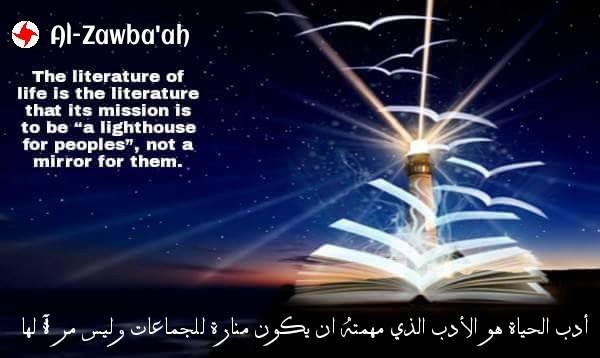“Literature, exclusively, in its poetic and prose styles”, Sa´adeh states, “is a skill intended to reveal the thought and consciousness as much precisely and magnificently as it could be”.[1] For him, the poet is a talented person whose main concern is to highlight beauty and greatness in both spiritual and material spheres. As he puts it:
The poet, to me, is he who is concerned with highlighting the most esteemed and the most beautiful in every realm of thought, feelings or matter. I here add that I see as one of the most important characteristics of poetry the highlight of feelings, emotions and sensation in every thought or every cause that upholds the elements of the soul, and giving those feelings, sensation and emotions figurative or imaginative images, that have the elements of strength, beauty and sublimation, without parting company with the truth and the human goal.[2]
Sa´adeh emphasizes though that literature is not exactly the thought or the consciousness. Thus, it cannot of its own cause innovation. “That is why I believe that innovation in literature is an effect and not a cause, it is an effect caused by a renewal or transformation in thought and consciousness as well as in life and the attitude towards it. It is an outcome of spiritual, materialistic and socio-political revolution taking place that changes the life of an entire people, its living conditions and opens new horizons for the intellect and its methods and the consciousness and its trends”.[3] Literature is not independent from the process of national revival; rather, it is very linked to it. It is an expression of it. As Sa´adeh conceptualized, literature “seeks the foremost fundamental reality of a better life in a world of beauty and higher values.”[4]
Generally speaking, literature, according to Sa´adeh, accompanies life by expressing its fundamental nature and disclosing its facts and mysteries. Moreover, literature can serve the nation’s interests and fulfill its needs by expressing its aspirations and lofty ideals and revealing its talents and capabilities. It can be, as he says, “a lighthouse for peoples”, not a mirror for them.[5] From this it follows that the scholar must be committed to his people and their causes, articulating their aspirations and striving to transform their present circumstances into a better future. It can be seen, accordingly, that Sa´adeh’s views of literature reflected the national sentiment, that swept the Arab World throughout the second decade of the twentieth century, and the fervent quest for national and political identity. Rabi’a Abifadel noted, in agreement with Antun Ghattas Karam, that:
He [Sa´adeh] belonged to an elite group of writers of the age of literary revival in the Arab East who formulated prose-poems that “revolt against injustice and feudalism, objectify the maladies begot in colonization, appeal to valour and energy in the struggle against ignorance, poverty, and slavery, call for the liberation of woman and encourage the spread of knowledge.”[6]
According to Sa´adeh, literature is not an irresponsible game or a hobby produced for personal enjoyment. Rather, it is an art that can be used to arrive at a new understanding of life, elevating the souls to a higher level. Moreover, literature plays an important role in national education and socialization. It strives to be a universal literature that carrys a mission to the world and attracts its attention. How can literature be universal? Simply stated, it can be universal by functioning as a means to convey the thought and consciousness that emanate from the “new outlook” to the sentiment of society and its comprehension and to the hearing of the whole world and its eyesight.[7]
[1] Antun Sa´adeh, As-Sira’ al-Fikri fil-Adab as-Suri, (Intellectual Struggle in Syrian Literature) (Beirut: SSNP, 1960), p. 29.
[2] Ibid., 31-32.
[3] Ibid., p. 29.
[4] Ibid., p. 69.
[5] Ibid., p. 45.
[6] Rabia´ah Abi Fadel,, Antun Sa´adeh: The Mahajari Scholar and Critic, (Maktabat al-Deerasset al-Ilmyyah, Lebanon, 1992), p. 205. See also Adel Beshara (ed.) Antun Sa´adeh: The Man, His Thought – An Anthology, UK: Ithaca, 2007, p. 457.
[7] Antun Sa´adeh, As-Sira’ al-Fikri fil-Adab as-Suri, op. cit., p. 66.

